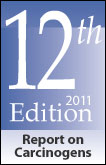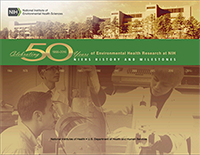Research Highlights
The vision of the NIEHS is to use environmental health sciences to understand human disease and improve human health. Below are some research highlights from NIEHS scientists since its founding in 1966.
Click on the headers below (Date and Title) to sort by year or title. Click on the tags below each highlight to filter by tag, or use the search box to enter a search term.
2016
NIEHS History and Milestones
The National Institute of Environmental Health Sciences (NIEHS) has come a long way in the last 50 years making environmental health research responsive to the needs and concerns of the American people, and making environment part of the public health debate. Environmental justice is an everlasting core value for NIEHS research. Preventing disease by acknowledging and managing our environment continues to be a source of motivation and purpose for NIEHS staff and our research partners.
Full Highlight: NIEHS History and Milestones
Tags:
2014
NIEHS' National Toxicology Program released the 13th Report on Carcinogens
October 2, 2014 — NIEHS' National Toxicology Program released the 13th Report on Carcinogens listing 243 substances as "known" or "reasonably anticipated" to cause cancer in humans. The bi-annual report is a science-based document that identifies chemical, biological, and physical agents determined to be cancer hazards for people living in the United States, prepared by NTP on behalf of the U.S. Department of Health and Human Services. The four substances added to the report include: Ortho-tolui
Full Highlight: NIEHS' National Toxicology Program released the 13th Report on Carcinogens
Tags: National Toxicology Program, Report on Carcinogens, acetone, cumene, human carcinogen, known, pentachlorophenol, phenol, reasonably anticipated
2013
World Health Organization (WHO) Collaborating Centre for Environmental Health Sciences
September 2013 — NIEHS was designated as a World Health Organization (WHO) Collaborating Centre for Environmental Health Sciences. As a WHO Collaborating Centre, NIEHS joins a network of academic and scientific institutions around the world dedicated to information exchange and technical cooperation. The Collaborating Centre at NIEHS will focus on five priorities for research and research translation — children's environmental health, climate change and human health, developmental origins of he
Tags: Collaborating Centre, Environmental Health Sciences, WHO, World Health Organization, children's environmental health, climate change and human health, developmental origins of health and disease, e-waste, indoor air pollution
2012
NIEHS's New Strategic Plan: 2012-2017

August 1, 2012 – NIEHS director introduces the 2012-2017 strategic plan for NIEHS, "Advancing Science Improving Health: A Plan for Environmental Health Research." NIEHS, with the help of its stakeholders, lays out a plan that has descriptive strategic themes and 11 goals that are identified as priority areas for the field. As the NIEHS moves forward, our overall goal is to make the institute, including the National Toxicology Program (NTP), the foremost trusted source of environmental health knowledge, leading the field in innovation and the application of research to solve health problems.
Full Highlight: NIEHS's New Strategic Plan: 2012-2017
Tags: Toxicity, children's health, genes, lung
2011
New substances added to HHS Report on Carcinogens

On June 10, 2011, the U.S. Department of Health and Human Services added eight substances to its Report on Carcinogens, a science-based document that identifies chemicals and biological agents that may put people at increased risk for cancer.
Full Highlight: New substances added to HHS Report on Carcinogens
Tags: National Toxicology Program Report on Carcinogens, cancer, carcinogens


